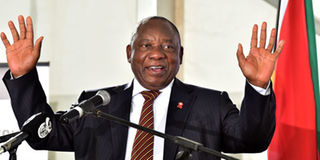Domestic problems mount for South Africa’s Ramaphosa

What you need to know:
- Beyond much-increased union militancy, which has in the last week seen a strike by workers for Eskom, SA’s state-owned power producer, leading to sabotage and costly power outages around the country, there is also a growing militancy around land invasions, which Economic Freedom Fighters leader Julius Malema is calling for, in full populist mode.
Things domestically are getting very tough for South African President Cyril Ramaphosa and his administration.
Beyond much-increased union militancy, which has in the last week seen a strike by workers for Eskom, SA’s state-owned power producer, leading to sabotage and costly power outages around the country, there is also a growing militancy around land invasions, which Economic Freedom Fighters leader Julius Malema is calling for, in full populist mode.
Against this backdrop, further instability seems unavoidable as the SA economy continues to weaken with the full effects of the wasteful and useless expenditures of public funds in the Zuma era biting ever-deeper. The South African currency was buoyed briefly by Ramaphosa’s election in December to lead the ruling African National Congress (ANC), and his subsequent elevation to President with the forced resignation of Zuma in February.
But it has since fallen back to levels reflecting the lack of local and international investor confidence last seen at the height of the uproar over Zuma’s “state capture” system of patronage, maladministration, corruption and incompetence.
The second quarter Gross Domestic Product number, a staggering -2.2 per cent, reflects the shrinkage in the SA economy as the ripple effects of billions of dollars in diverted public funds hits home.
Almost everyone in the country is feeling not merely the “pinch” as the economy shrinks, but an extreme squeeze on their both their income and their ability to meet rising costs spurred on by exchange rate inflation, hitting people at the fuel pump and across the board as prices rise.
All this is bad news for Ramaphosa’ new administration, now barely four months old, as he struggles to rectify the country’s listing economy and re-instil some investor confidence in the wake of the Zuma era. For their part, investors have not flocked back into the South African market, taking a more cautious “wait-and-see” approach despite Ramaphosa’s appeal to global business leaders.
The “Ramaphoria” period which saw a big boost in business confidence locally and international ratings agencies posting more positives outlooks for SA is now long over.
Ramaphosa is still smiling broadly and trying to soothe land and property owners’ fears after his party adopted land expropriation without compensation – against the current constitution’s position on this subject – while trying to woo direct foreign investment. Part of that drive has begun with what will be several rounds of public participatory hearings in all of the country’s nine provinces on the vexed land issue.
Ramaphosa has been saying all along that expropriation without compensation would be used carefully to avoid creating the impression that SA was engaging in the sort of post-colonial era land-grab that drove the Zimbabwean economy into the ground.
He has been heard, but while the issue remains under debate, and property and land rights are in question, he can more or less forget about foreign investors rushing back into the SA market. Despite all these issues, each of which is troubling in its own right, Ramaphosa’s main problem is with his own party.
No less than four out of eight ANC-ruled provinces are in utter disarray as far as the ANC’s organisational structure is concerned: North West Province, Eastern Cape, Free State and KwaZulu-Natal.
In each case, there have been court actions, violent street protests and schisms within the ruling party over representation at provincial level.
At the heart of the matter are twin issues: personal ambition for advancement within the ruling party and factionalism driven by those for and those against the Zuma-style system of patronage governance.
There is no doubt that Ramaphosa means what he has said and that he intends to root out corruption, nepotism and incompetence.
He has already gone a long way to do that in some state-owned enterprises, the largest of which have had entirely new boards appointed since his administration got underway.
But sorting out his own party’s struggle with and against corruption is another matter since the rivalries now existing within the party – seen by many as a viable “career choice” in terms of getting ahead in the world – have driven apparently unbridgeable divides between those who wish to return to the “good old days” under Zuma and those who want something entirely different.
The contention for personal advancement is behind much of the violence which has seized both KwaZulu-Natal province – SA’s largest by population and home to the Zulu tribe of which Zuma is a member – and its northern neighbour Mpumalanga, home to deputy ANC and national President David Mabuza.
Between these two provinces, well over 250 people have died in recent months in what has been, at least to some extent, the outcome of both political differences and personal rivalries for positions like local government councillors.
Given South Africa’s high unemployment numbers – officially nearly 27 per cent, but unofficially rather higher than that, and as high as 60 per cent for those under 25 who are in the job market – a local councillor’s salary and a prime position for higher things to come have proven to be juicy offerings which have led to scenes of mayhem at branch meetings, provincial party conferences, courts ruling against provincial ANC conference elections, threats, intimidation and dozens of assassinations.
All four the named provinces are heartland regions for the ANC and having them divided with rival factions at each other’s throats, metaphorically and literally, is laying the groundwork for the ANC to potentially lose its outright majority in next April’s national elections and much reduced control over all provinces.




